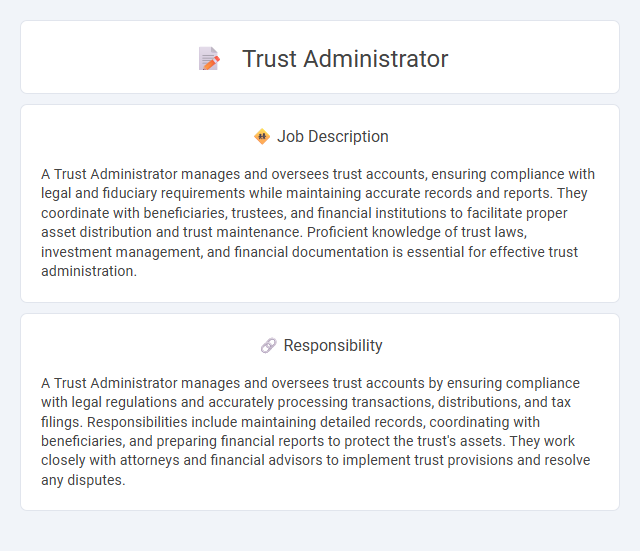
A Trust Administrator manages and oversees trust accounts, ensuring compliance with legal and fiduciary requirements while maintaining accurate records and reports. They coordinate with beneficiaries, trustees, and financial institutions to facilitate proper asset distribution and trust maintenance. Proficient knowledge of trust laws, investment management, and financial documentation is essential for effective trust administration.
Individuals with strong organizational skills and attention to detail are likely suitable for a trust administrator role, as the job requires managing complex financial documents and adhering to legal regulations. Those comfortable with confidentiality and sensitive client information may handle the responsibilities effectively. Conversely, people who struggle with multitasking or have low tolerance for regulatory compliance might find this position challenging.
Qualification
A Trust Administrator typically requires a bachelor's degree in finance, accounting, business administration, or a related field to manage client trusts effectively. Professional certifications such as Certified Trust and Financial Advisor (CTFA) or Chartered Financial Analyst (CFA) enhance credibility and expertise in trust management. Essential qualifications include strong knowledge of fiduciary laws, financial regulations, and excellent analytical and communication skills to ensure accurate trust administration and client satisfaction.
Responsibility
A Trust Administrator manages and oversees trust accounts by ensuring compliance with legal regulations and accurately processing transactions, distributions, and tax filings. Responsibilities include maintaining detailed records, coordinating with beneficiaries, and preparing financial reports to protect the trust's assets. They work closely with attorneys and financial advisors to implement trust provisions and resolve any disputes.
Benefit
A Trust Administrator likely plays a crucial role in managing and safeguarding client assets, ensuring compliance with legal and fiduciary requirements. The position probably offers benefits such as comprehensive health insurance, retirement plans, and opportunities for professional growth in the financial services industry. Job stability and a structured work environment are also potential advantages that may attract candidates seeking long-term career prospects.
Challenge
The challenge of a trust administrator role often involves managing complex financial and legal responsibilities with precision to ensure compliance and protect beneficiaries' interests. Navigating varied trust structures and addressing beneficiary disputes may require a high level of expertise and meticulous attention to detail. Strong communication skills are likely essential to effectively coordinate with legal professionals, financial advisors, and clients.
Career Advancement
A Trust Administrator manages client trust accounts, ensuring compliance with legal and financial regulations while coordinating asset distribution. Expertise in estate planning, fiduciary responsibilities, and financial management can lead to career advancement into senior fiduciary roles or trust officer positions. Developing skills in regulatory compliance and client relationship management enhances opportunities for leadership roles within banking or financial services firms.
 kuljobs.com
kuljobs.com